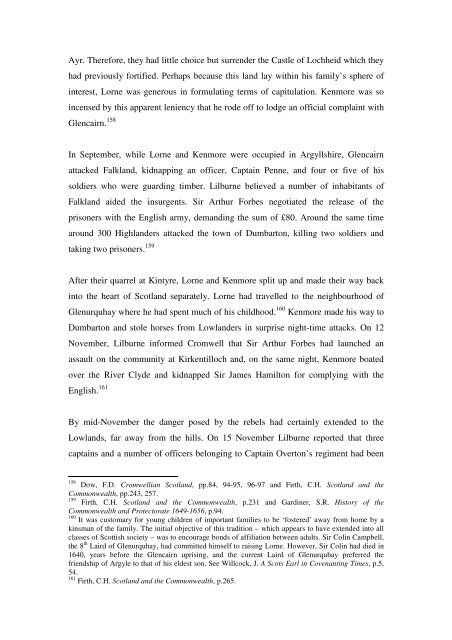The Glencairn Uprising, 1653-54 Helen Baker Department of ...
The Glencairn Uprising, 1653-54 Helen Baker Department of ...
The Glencairn Uprising, 1653-54 Helen Baker Department of ...
You also want an ePaper? Increase the reach of your titles
YUMPU automatically turns print PDFs into web optimized ePapers that Google loves.
Ayr. <strong>The</strong>refore, they had little choice but surrender the Castle <strong>of</strong> Lochheid which they<br />
had previously fortified. Perhaps because this land lay within his family’s sphere <strong>of</strong><br />
interest, Lorne was generous in formulating terms <strong>of</strong> capitulation. Kenmore was so<br />
incensed by this apparent leniency that he rode <strong>of</strong>f to lodge an <strong>of</strong>ficial complaint with<br />
<strong>Glencairn</strong>. 158<br />
In September, while Lorne and Kenmore were occupied in Argyllshire, <strong>Glencairn</strong><br />
attacked Falkland, kidnapping an <strong>of</strong>ficer, Captain Penne, and four or five <strong>of</strong> his<br />
soldiers who were guarding timber. Lilburne believed a number <strong>of</strong> inhabitants <strong>of</strong><br />
Falkland aided the insurgents. Sir Arthur Forbes negotiated the release <strong>of</strong> the<br />
prisoners with the English army, demanding the sum <strong>of</strong> £80. Around the same time<br />
around 300 Highlanders attacked the town <strong>of</strong> Dumbarton, killing two soldiers and<br />
taking two prisoners. 159<br />
After their quarrel at Kintyre, Lorne and Kenmore split up and made their way back<br />
into the heart <strong>of</strong> Scotland separately. Lorne had travelled to the neighbourhood <strong>of</strong><br />
Glenurquhay where he had spent much <strong>of</strong> his childhood. 160 Kenmore made his way to<br />
Dumbarton and stole horses from Lowlanders in surprise night-time attacks. On 12<br />
November, Lilburne informed Cromwell that Sir Arthur Forbes had launched an<br />
assault on the community at Kirkentilloch and, on the same night, Kenmore boated<br />
over the River Clyde and kidnapped Sir James Hamilton for complying with the<br />
English. 161<br />
By mid-November the danger posed by the rebels had certainly extended to the<br />
Lowlands, far away from the hills. On 15 November Lilburne reported that three<br />
captains and a number <strong>of</strong> <strong>of</strong>ficers belonging to Captain Overton’s regiment had been<br />
158<br />
Dow, F.D. Cromwellian Scotland, pp.84, 94-95, 96-97 and Firth, C.H. Scotland and the<br />
Commonwealth, pp.243, 257.<br />
159<br />
Firth, C.H. Scotland and the Commonwealth, p.231 and Gardiner, S.R. History <strong>of</strong> the<br />
Commonwealth and Protectorate 1649-1656, p.94.<br />
160 It was customary for young children <strong>of</strong> important families to be ‘fostered’ away from home by a<br />
kinsman <strong>of</strong> the family. <strong>The</strong> initial objective <strong>of</strong> this tradition – which appears to have extended into all<br />
classes <strong>of</strong> Scottish society – was to encourage bonds <strong>of</strong> affiliation between adults. Sir Colin Campbell,<br />
the 8 th Laird <strong>of</strong> Glenurquhay, had committed himself to raising Lorne. However, Sir Colin had died in<br />
1640, years before the <strong>Glencairn</strong> uprising, and the current Laird <strong>of</strong> Glenurquhay preferred the<br />
friendship <strong>of</strong> Argyle to that <strong>of</strong> his eldest son. See Willcock, J. A Scots Earl in Covenanting Times, p.5,<br />
<strong>54</strong>.<br />
161 Firth, C.H. Scotland and the Commonwealth, p.265.
















